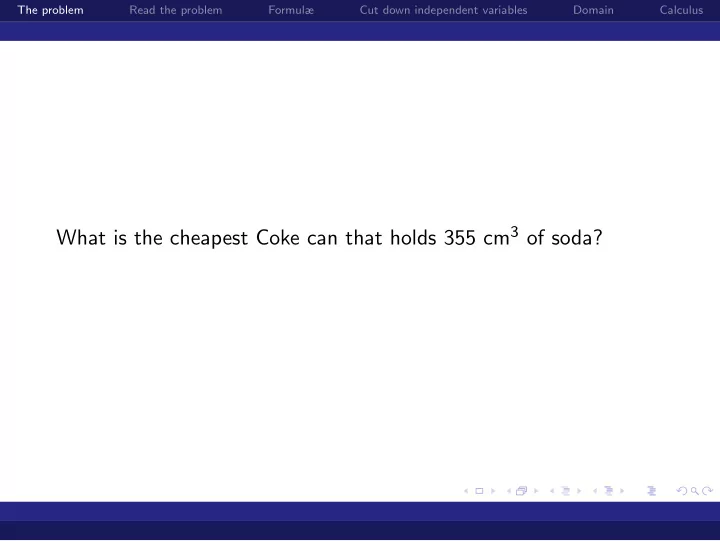

The problem Read the problem Formulæ Cut down independent variables Domain Calculus What is the cheapest Coke can that holds 355 cm 3 of soda?
The problem Read the problem Formulæ Cut down independent variables Domain Calculus Cheapest . . . : Minimum cost Cost is proportional to surface area Coke can is a cylinder (approximately)
The problem Read the problem Formulæ Cut down independent variables Domain Calculus Surface area: SA = 2 · π r 2 + 2 π r · h ���� ���� base base area perim. Volume: V = π r 2 h = 355 (in cubic centimetres) r , h are radius, height of can (in centimetres)
The problem Read the problem Formulæ Cut down independent variables Domain Calculus Two independent variables, r and h � 355 = π r 2 h ⇒ h = 355 355 π r 2 or r = π h SA = 2 π r 2 + 2 π r 355 π r 2 = 2 π r 2 + 710 r
The problem Read the problem Formulæ Cut down independent variables Domain Calculus r is a length, so r ≥ 0 r = 0 is impossible (would give V = 0) r can be very big (if the can is short) Domain is (0 , ∞ )
The problem Read the problem Formulæ Cut down independent variables Domain Calculus SA = 2 π r 2 + 2 π r 355 π r 2 = 2 π r 2 + 710 r d r SA = 4 π r − 710 d r 2
The problem Read the problem Formulæ Cut down independent variables Domain Calculus d r SA = 4 π r − 710 d r 2 Undefined at r = 0 (not in domain) Zero when 4 π r = 710 r 2 4 π r 3 = 710 � 355 3 r = 2 π
The problem Read the problem Formulæ Cut down independent variables Domain Calculus SA r 0 ∞ � 355 3 277 . 5 2 π ∞ ∞ � 355 3 So optimum dimensions are r = 2 π ≈ 3 . 837, � h = 355 355 3 π r 2 = 2 2 π ≈ 7 . 674 (in centimetres) Actual dimensions: r ≈ 3 . 2 cm, h ≈ 11 cm
Recommend
More recommend